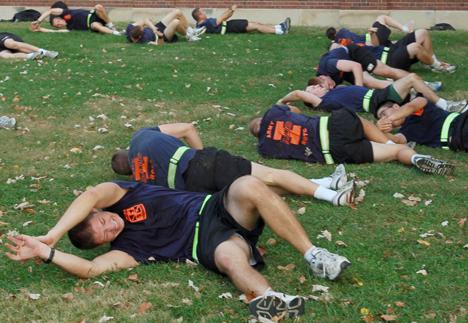ROTC battalion instills skills for life, not just war
Oct 5, 2006
The sun slowly rises over the Armory as Army ROTC cadets go through a series of stretches, push-ups, sit-ups and other exercises – followed by a four-mile run.
These physical training sessions are held three mornings a week, from 6:20 a.m. to 7:30 a.m. The more demanding ranger’s challenge group meets four mornings a week, starting earlier at 6:00 a.m.
“Some days when you’re up until two doing homework . it’s hard waking up at 5:15,” said John Cvikota, freshman in LAS. “You’re not even thinking, you’re just getting dressed in the dark and then you just go to it. Then when the cold air hits your body, that’s when you wake up”.
Army ROTC cadets are subject to the same schedules of student life, with about eight to ten hours a week committed to ROTC. This time includes physical training, two classes a week and a weekly lab.
“It’s stressful a lot of times because I have a lot going on,” said Lisa Klekowski, senior in LAS. “I have to balance ROTC with all my schoolwork but I enjoy what I’m doing in ROTC. I feel like it’s really going to prepare me when I’m actually an officer.”
Get The Daily Illini in your inbox!
Despite the time commitment, Major Jeffrey White stresses that grades come first. He said that GPA is the primary factor in deciding whether cadets get their first choice as to what job they prefer in the army after graduation. White said he finds a strong correlation between good physical fitness and a good GPA.
Students can join ROTC without any commitment to the army until the beginning of junior year. Some scholarships require earlier commitment. The state scholarship, which covers full tuition, does not.
“When I joined initially, I wasn’t really planning to stay but as I went through the year, during my freshman year, I decided I really liked the program so I stuck with it,” said Jenny Bellendir, sophomore in ACES.
The war in Iraq has not affected the number of people joining ROTC or signing contracts, as far as White can tell.
“There have been additional questions with that and I always say there’s no commitment for the first two years . after four years of college there’s almost another year before they can get into a unit,” White said. “What will the world be like in five years? It could be better, it could be worse.”
Cvikota, like many others, was not deterred from joining ROTC. He has wanted to join the military since childhood.
“If you’re truly thinking about joining a military service, you almost have that in mind,” he said. “Your job is to fight.”
The influence of Army ROTC extends into civilian life as well. Leadership and self-confidence are the most useful things to take from the program, White said. These traits are especially stressed in labs and physical training.
“It’s helping to develop my leadership abilities because I’m a very introverted type person,” said Derek Evans, junior in Engineering. “They put you into leadership positions immediately, so you get placed up there and you have to take charge”.
Out of the 90 cadets in Army ROTC, about 20 go on to the Army every year, White said and the national program accounts for 75% of the Army’s officers.






